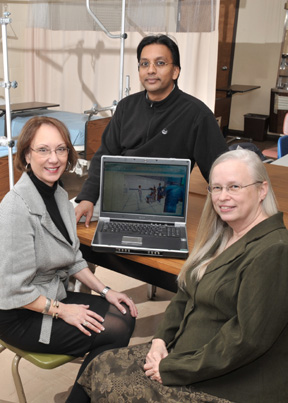New ISU HRSA grant to better prepare nurses for rural practice
November 13, 2008
Practicing nursing in rural communities isn’t the same as practicing in cities. A four-month rural nurse residency is being developed at Idaho State University to improve patient care and increase nurse confidence.
The U.S. Health and Resources and Services Administration funded a three-year, $711,104 grant to prepare nurses in a five-state region. Idaho State University will use rural experts to teach new nurses advanced skills rural generalists to care for clients in hospitals and communities.

“This is a region-wide telemedicine, Web-based nursing residency for all rural nurses,” said Deana Molinari, Ph.D., RN, CNE, ISU associate professor of nursing and the grant’s principal investigator. “This program will help new graduates, re-entering nurses and nurses transitioning from urban to rural environments.”
The grant was awarded to the ISU Kasiska College of Health Professions School of Nursing.
“The rural nurse is a generalist, with specialist knowledge in crisis assessment and management,” Molinari said. “A rural hospital nurse may have to treat obstetrics, pediatric, medical-surgical, psychiatric, geriatric and trauma emergency patients all in the same day. The nurse may move from triaging a head injury patient in an emergency, to teaching a mother how to breast feed, and then treating a geriatric patient with dementia.”
Furthermore, rural nurses often practice as the only nurse in the unit, work inter professionally and use less technology.
“Rural people tend to delay going into health care providers until they can no longer work or are in crisis,” Molinari said. “This can put a lot of pressure on a nurse, and many nurses just graduating from school or transitioning from an urban setting are not prepared for what they encounter in a rural setting. A residency is needed to prepare nurses with the advanced skills needed by rural employers.”
In an urban hospital a new graduate is generally assigned to a care unit – whether it is obstetrics, medical-surgical, psychiatric or trauma – where they focus on specific knowledge about that specialty.
In a rural setting, the nurse must know something about every type of illness and patient age. In community health settings the rural nurse also practices many skills not taught in basic educational programs. In addition, rural communities may mistrust a new professional especially if they have just moved into the community.
Because the contrast between practicing nursing in an urban and rural setting is extreme, the turnover is high and retention rate is low for rural nurses.
“The literature states the turnover rate is between 25 and 65 percent during the first year,” Molinari said. “The cost of replacing a new nurse is considered to be one-and-one-half times their yearly salary.” Molinari said.
States being covered by the grant include Alaska, Idaho, Montana, Washington and Wyoming. Specifically, the grant’s partners are the ISU Institute of Rural Health, The Hospital Cooperative, The Wyoming and Montana Offices of rural health and Western Washington Area Health Education Center, and the Alaska Hospital and Nursing Home Association.
One unique aspect of this residency Is that it will be delivered to wherever the nurses are working. Hospitals will not have to pay to replace the nurses while they study in an urban site. Expert rural nurses from around the region will teach the classes.
“The nursing residency will increase participants’ critical-thinking, communication, leadership, collaboration and patient care skills. It will be delivered to rural sites, where ever the nurses are practicing, using telemedicine and rich media, such as Elluminate, Play2Train and other Web technologies,” Molinari said. “Nurses can participate from their homes or workplace, and won’t have to travel to an urban site and pay expensive travel costs.”
Residents will participate in a four-month program that consists of several elements including:
• 64 hours of distance-learning seminars including seven core curriculum sessions and seven electives;
• 104 hours of supervised clinical experience; and
• a simulation workshop for skills-competency testing.
ISU will coordinate rural expert teachers and measure quality. The project trains and supports preceptors. A standardized student assessment, teaching and evaluation process will be used by all participants.
Support for preceptors includes 16 hours of specialized education and a mentor for their first assignment. Preceptors will also be mentored through their first assignment.
Upon passing a test and clinical experience, students will receive a certified rural nurse preceptor certificate. They also receive an honorarium, and regional recognition.
For more information on this program, contact Molinari at molidean@isu.edu or (208) 282-2982.
Categories:
